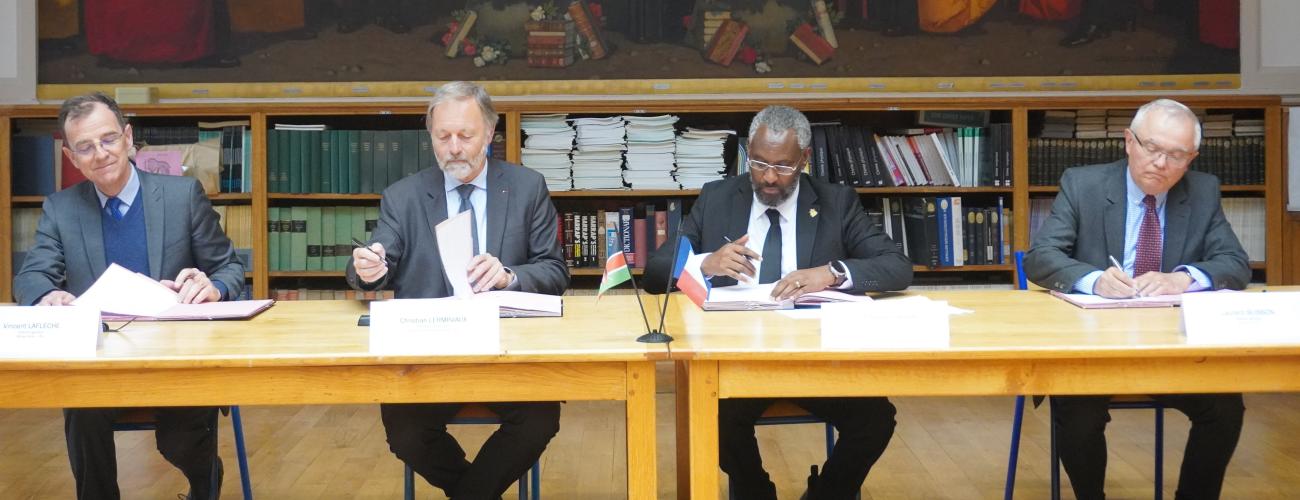
Newsletter 16: ParisTech and the University of Nairobi join forces to enhance engineering education
On 11 May, four of the ParisTech schools (AgroParisTech, Chimie ParisTech – PSL, École des Ponts ParisTech, Mines Paris – PSL), along with CentraleSupélec/Université Paris-Saclay, signed a Tripartite Partnership Agreement (TPA) with the University of Nairobi (UoN).
Interview with Christian Lerminiaux, President of ParisTech and Prof. Stephen Kiama, Vice-Chancellor
of the University of Nairobi
What is your international strategy?
CL : From the outset, the strategy of the ParisTech engineering schools has been to promote the value of the French engineering education system and train students – both French and international – to become the business leaders and decision makers of the future. Today’s graduates must be prepared to work in any country in the world. In the past we’ve focused a lot on emerging countries, through partnerships with universities and joint training programs and institutes and so on. It is clear that Africa, and Englishspeaking Africa in particular, is set to play a strategic role in our world’s future. Kenya has great potential, and the University of Nairobi is the country’s largest university, making it the ideal partner for us. The number of French companies operating out of Kenya has tripled in just a few years, and we also want to support these companies – and others in the country – as they grow.
SK : The international strategy of the University of Nairobi is to host more international students and to recruit more international faculty. This partnership is a unique opportunity, allowing us to expose our students and faculty to more international opportunities than we can offer today. Internationalization is part of the agreement. Indeed, we have traditionally formed partnerships with English-speaking countries. Now our students will get the opportunity to go to Frenchspeaking countries. The partners of this Tripartite Partnership Agreement have been selected by the French Embassy because they are the best in their domain and it was difficult for us to choose just one.
What do you hope to achieve through the partnership?
CL : It has to be a win-win arrangement. This partnership with the UoN is an opportunity to showcase our successful training model, in particular the way we use research- and innovation-based learning to produce graduates who are not just highly skilled, but also highly employable. Our students go on to become engineers, researchers, managers, and entrepreneurs. In line with the French Tech initiative, the creation of startups is now an integral part of all our programs. In developed countries this type of training model, where students acquire two sets of skills in parallel – in science and engineering, and in management – is quite rare. We hope that through this partnership the French schools will be able to guide the UoN in training the managers and leaders that its country needs. We also want to collaborate closely with the UoN on academic and scientific projects. The four ParisTech schools have many tools to offer in all five focus areas of the partnership – governance, curricula, research, innovation, and internationalization. Together, we will assess which tools are relevant for the University of Nairobi and how it can adapt them to the local context.
SK : We have studied a number of engineering faculties in the world. We’ve observed how they’re run, and how they address internationalization. I know we can learn from them, particularly how universities have good relationships with the private sector, especially startups. In this area we need to make our students more employable and to create jobs. Many companies are expanding. Students should have a disruptive approach. We see this partnership as an opportunity for learning not only for our students and faculty, but also for French students and staff too. Indeed, the University of Nairobi is a good partner: a leading university in Kenya and in East Africa. It’s a great opportunity to develop international connections in both faculties (science and technology; engineering). One of the first goals of the
partnership is to establish the Engineering and Science Complex, funded by a sovereign loan from AFD and the Government of Kenya. It’s an opportunity to develop a new approach to teaching and learning, and reflect on governance issues and curricula. It’s an entry point for short- and long-term partnerships and opportunities for young people. Food security and climate change for instance are common areas of interest.
You have visited some of the ParisTech schools. What lessons did you learn?
SK : The Problem-Based Learning (PBL) approach and entrepreneur skills are very interesting. It is necessary to combine technical skills and soft skills, including in finance and management, so that students learn to deal with human problems as well as infrastructure problems. Links to industry are important too: working closely with companies in group discussions so that students know why they are hiring, what their needs are, and what gaps there are to fill. The labs and equipment are also quite impressive. Infrastructures are also important. We need to have partnerships both within the university and outside. That’s what the university and the government want.
What can the French schools learn from you?
SK : Every society’s approach is different. Our students and staff learn with a different approach because we address local problems in Africa. This cooperation may help French students open up to a different approach and a different culture.They will have to think about our needs. In Kenya there are actually more opportunities for startups. The students could form teams. Companies can develop with French and Kenyan people in their teams.

